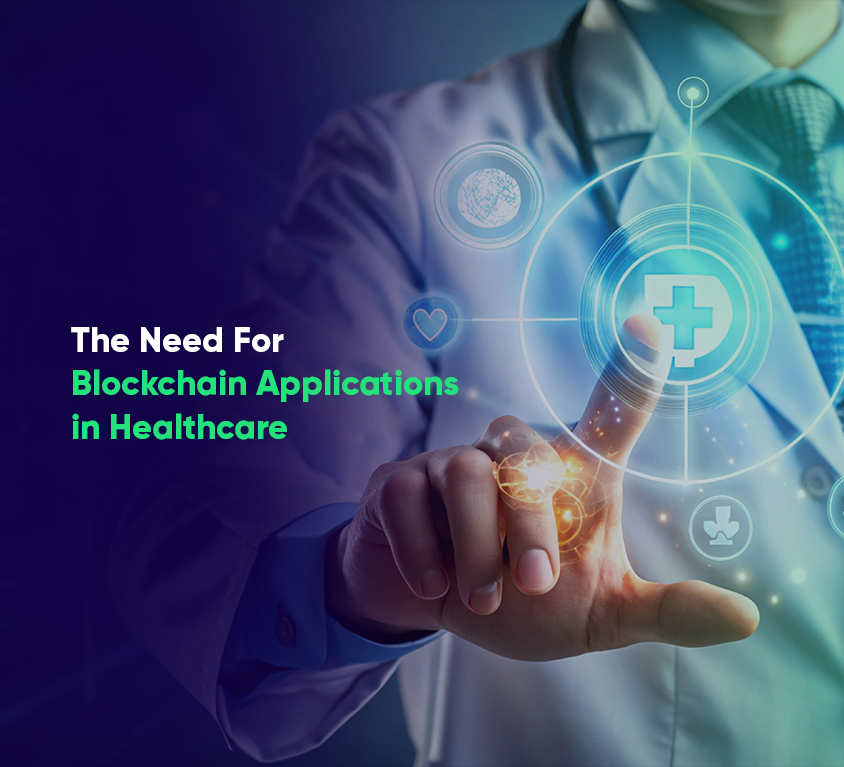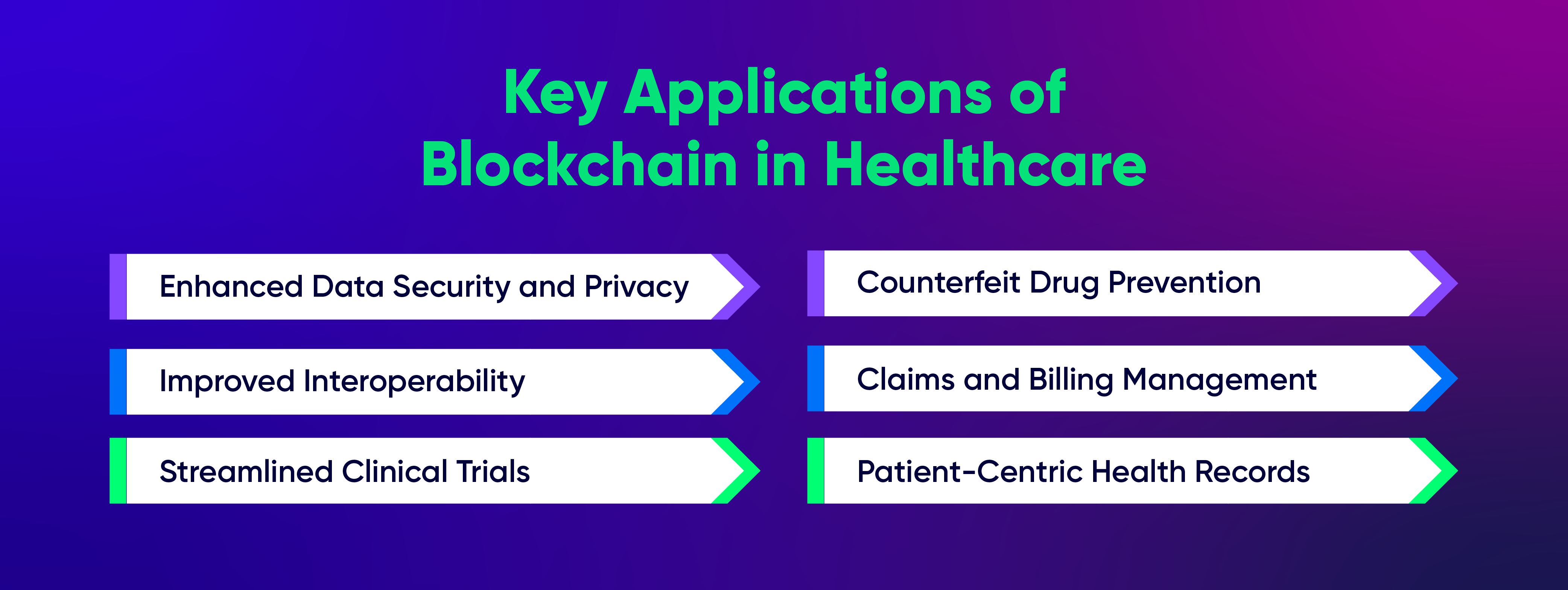
Introduction
Web3 & Blockchain Consultancy :
The Need For Blockchain Applications in Healthcare
The rise of blockchain technology has been a game-changer across various industries, offering unprecedented security and transparency in data management. In the healthcare sector, blockchain presents an opportunity to address numerous long-standing challenges related to data privacy, security, and interoperability. This technology could revolutionize how medical data and records are stored, shared, and managed, leading to enhanced patient care, reduced costs, and improved efficiencies.Key Takeaways
- Blockchain technology enhances data security and patient privacy through encryption and decentralized storage.
- Improved interoperability through blockchain allows for seamless sharing of medical records across different healthcare providers.
- Blockchain applications can streamline clinical trials by ensuring data integrity and simplifying regulatory compliance.
- The use of blockchain in the pharmaceutical supply chain helps prevent counterfeit drugs, ensuring patient safety.
- Blockchain technology reduces administrative costs in healthcare by automating billing and claims management processes.
- Implementing blockchain faces challenges such as technological complexity, integration with existing systems, and regulatory hurdles.
The Need for Blockchain in Healthcare
Healthcare systems around the world are constantly grappling with several significant challenges that compromise the efficiency and effectiveness of patient care. These issues primarily include fragmented data systems, a lack of secure data-sharing mechanisms, and cumbersome regulatory compliance procedures. Each of these factors plays a role in creating barriers that hinder the delivery of effective care and often lead to operational inefficiencies that are costly and time-consuming to address.Fragmented Data Systems
One of the most pressing issues in modern healthcare is the fragmentation of data across multiple platforms and institutions. Different healthcare providers often use disparate systems that are not designed to communicate with each other. This fragmentation leads to incomplete views of patient health records, making it difficult for medical professionals to offer the most effective treatment or make the best-informed diagnosis. Patients who visit multiple specialists might find that their doctors are making health decisions without the benefit of having a comprehensive medical history.Lack of Secure Data Sharing
Secure data sharing is paramount in healthcare, where the privacy and security of patient information are legally protected and ethically imperative. Traditional methods of data exchange are susceptible to breaches and unauthorized access due to their centralized nature. This lack of security can lead to sensitive health information being exposed, causing significant privacy concerns and undermining patient trust in the healthcare system.Cumbersome Regulatory Compliance
Healthcare providers are also faced with the complex task of adhering to strict regulatory requirements for data handling and patient privacy. Compliance is both essential and challenging, given the varied and ever-changing nature of these regulations across different jurisdictions. Ensuring compliance often requires substantial resources, which can divert attention from patient care to administrative tasks.Blockchain as a Solution
Blockchain technology addresses these challenges through its core characteristics: decentralization, immutability, and encryption. By decentralizing the storage of data, blockchain removes the single points of failure associated with centralized data systems, significantly enhancing the security and resilience of information systems against cyber attacks. The immutable nature of blockchain ensures that once information is entered into the ledger, it cannot be altered or deleted, which is crucial for maintaining the integrity of medical records and complying with audit trails required by regulatory bodies. Furthermore, the use of encryption secures the data against unauthorized access, ensuring that only those with the correct permissions can view sensitive information.Real-Time Data Sharing in Critical Scenarios
In critical health scenarios, such as the management of epidemics or during emergency responses, real-time, reliable data sharing becomes crucial. Blockchain can facilitate this by allowing instantaneous access to up-to-date and accurate medical records across different providers and stakeholders. This capability ensures that all parties involved in patient care have immediate access to essential information, which can be life-saving in emergencies and crucial for the containment and management of outbreaks.Key Applications of Blockchain in Healthcare

-
Enhanced Data Security and Privacy
In the blockchain, data is broken down into encrypted blocks that are linked and secured using cryptography. Each transaction is recorded chronologically and becomes immutable once entered. This means that once patient data is recorded, it cannot be altered or deleted without the consensus of the network, ensuring data integrity. Such features prevent fraudulent activities and unauthorized access, which are common concerns in traditional healthcare databases. Additionally, blockchain can facilitate patient-driven privacy controls, allowing individuals to decide who can access their medical records, under what circumstances, and for how long.
-
Improved Interoperability
Effective treatment often requires a collaborative approach involving various healthcare providers. Blockchain enhances data interoperability through its ability to maintain a consistent, unalterable database across multiple entities and geographical locations. This unified approach not only ensures that every party has access to the same data but also eliminates inconsistencies and errors that typically arise from disparate systems. Moreover, it simplifies compliance with health data standards and regulations, which can vary significantly across regions.
-
Streamlined Clinical Trials
Managing clinical trials involves handling vast amounts of sensitive data, requiring robust systems to ensure its integrity and security. Blockchain can offer a more streamlined and secure framework for clinical trials by providing an immutable ledger for recording patient consent, trial results, and other critical data points. This transparency aids in maintaining regulatory compliance and ensures that data cannot be tampered with, thus protecting the validity of the research. Furthermore, blockchain can facilitate faster patient recruitment and more efficient communication between sites and sponsors, enhancing overall trial efficiency.
-
Counterfeit Drug Prevention
Counterfeit medication is a major global issue that compromises patient safety. Blockchain provides a powerful solution by enabling transparent tracking of drug provenance from the manufacturer to the end-user. Each transaction along the supply chain can be recorded on a blockchain, creating an auditable trail that verifies the authenticity of drugs. This system not only helps in identifying counterfeit products but also ensures compliance with pharmaceutical regulations and standards.
-
Claims and Billing Management
Blockchain can automate and streamline the claims and billing processes in healthcare by eliminating the need for intermediaries and reducing the potential for billing fraud. Smart contracts can be programmed to automatically verify and process claims based on pre-set rules, thereby minimizing errors and reducing administrative costs. This automation speeds up transactions, reduces paperwork, and increases transparency, leading to greater satisfaction among providers, insurers, and patients.
-
Patient-Centric Health Records
A decentralized approach to patient health records could transform how information is managed in the healthcare system. With blockchain, medical records can be kept up-to-date in real-time, with each entry time-stamped and securely linked to previous records. Patients can maintain control over their data, granting temporary access to healthcare providers as needed. This not only enhances privacy and control but also ensures that the data across healthcare providers is consistent and accessible, improving the quality of care and patient outcomes.